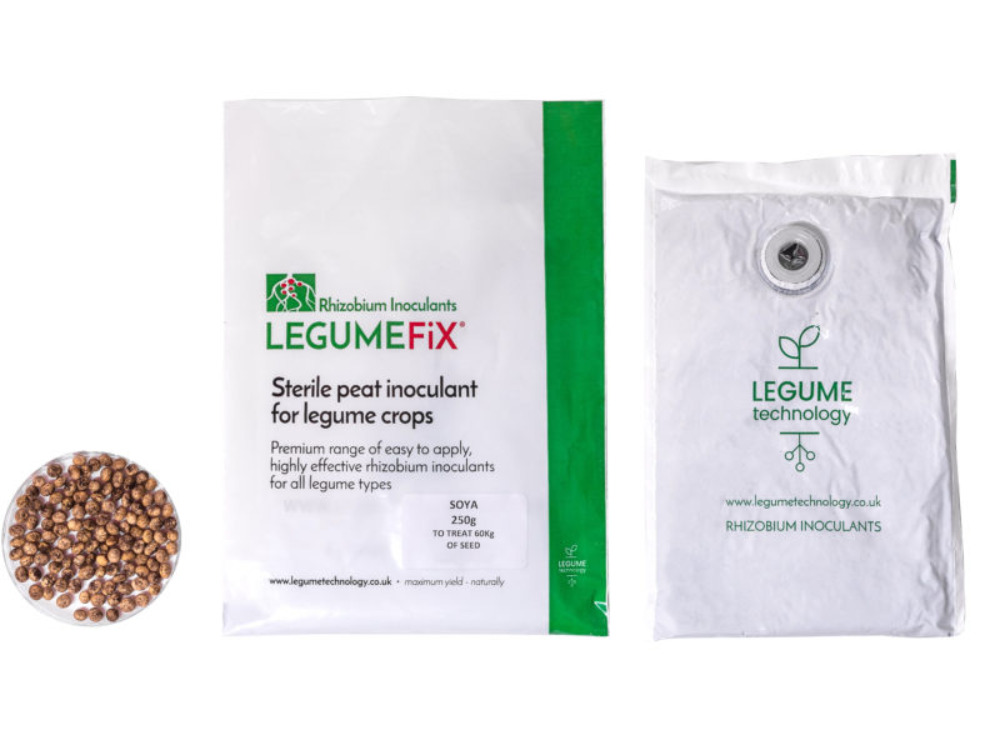Africa’s decline in soil fertility worsens each year, and crop yields are consequently plummeting, particularly for smallholder farmers whose survival is pegged on small pieces of land averaging half a hectare.
Though many factors cause this degenerating soil health, acidification has emerged as a major contributor, largely because of over-dependence on chemical fertilizers like DAP, CAN and urea to supply nitrogen.
British ag biotech company Legume Technology aims to rescue African soils from further deterioration by leveraging microbial biofertilizers proven to increase crop yield.
Founded in 2000, the company has spent the last two decades working with natural microbes, both bacteria and fungi, that have a unique ability to capture nitrogen — which makes up nearly 80% of the air — and make it available to crops. Called “biological nitrogen-fixers” (BNFs), these crop protection solutions are particularly ideal for the “legume” family of crops that includes peas, soya beans, and pulses, among others.
Barriers to biological adoption in Africa
“Biologicals are the future of agricultural productivity,” says Bruce Knight, Legume Technology co-founder and managing director.
He adds that in Africa, synthetic fertilizers are generally too expensive for most farmers; increased used of them also continues to impact soil health and cause other environmental problems.
A trained microbiologist with special interests in soil and bacteria that are beneficial for agricultural crops, Knight’s determination to provide smallholder farmers in Africa with cost-effective alternatives to expensive artificial nitrogen fertilizers started in 2007.
That year, he attended a Bill & Melinda Gates Foundation event in Arusha, Tanzania, where it became apparent that the use of BNFs in the continent was near non-existent. For a majority of farmers, chemical fertilizers are the only available inputs for adding nitrogen to the soil. This is in contrast to regions like Latin America, where biologicals adoption is more widespread.
In Africa, Legume Technology is one of the few companies offering inoculation technology to smallholder farmers and has managed to amass firsthand experience on the difficulties of biofertilizers adoption.
Though the company has been supplying legume molecules in at least 14 African countries for years, many smallholder farmers are locked out of adoption due to the packaging of these molecules. The firms packet size treats roughly 100 kilograms of seed — far too much for the majority of farmers that require an average of 30 kilograms.
Other homegrown companies — including MEA Ltd in Kenya, which produces Biofix, and the IITA Business Incubation Platform in Nigeria that develops NoduMax — have managed to package the inoculants in smaller sachets, but affordability remains a major barrier for uptake. Locally made products also face the limitations of provenance and quality while performance is usually sub-standard.
“Currently we compete with products made in Africa but we face the challenge of packaging despite our products being cheaper and having more than 5,000 times more bacteria,” explains Knight.
He adds that the availability of high-quality crop inputs in low-volume packaging is a huge limitation on realizing the potential of biofertilizer products in many African countries.
Apart from packaging and affordability, the fact that most of the BNFs in the market are limited to legume crops is another hurdle. In Africa, smallholder farmers grow many varieties of crops including non-legumes like maize, millets, sorghum and cassava.
On the continent, the effectiveness of its products has already been proven. In Tanzania, soybean yields have increased by 48% while in Senegal peanuts production has surged by 28%.
Legume Technology now has a major breakthrough in its attempt to push for increased use of biofertilizers in Africa.

Solving the packaging problems
This month, Legume Technology secured a £2.15 million ($2.83 million) grant from the Gates Foundation and the UK’s Foreign, Commonwealth & Development Office (FCDO) to further develop its offering as an affordable, accessible agricultural input for smallholder farmers.
Through the grant, the firm will be able to solve the twin challenges of packaging and crop diversification that have been hindering deeper penetration of BNFs in Africa.
For packaging, Legume Technology intends to design, build and install a new packaging line at its factory in the United Kingdom. The company intends to produce small packs, akin to a crisp packet, in a fast and economically efficient manner while maintaining a high quality. These packs will be both easily portable and highly affordable while keeping the contents fresh and free from contamination.
Quality packaging is very important for maintaining shelf life, as BNFs are live. For that reason, Legume Technology intends to replace its current products with more user-friendly versions, as well as better target package size to smallholders — between 50 and 100 grams.
Products are also shipped in sterilized packaging that makes it impossible for repackaging at a local level, which if done would reduce shelf life.
“Within that small bag will be a microbe that has the power to transform the lives of millions of African smallholders by making their crops grow bigger and better, with more productive harvests, without any environmental side-effects,” says Knight.
Beyond legumes
Apart from packaging, the grant will enable Legume Technology embark on a new three-year program of research to identify microbes that can work with non-legume staple crops.
Working with research institutes, specialist microbe ‘banks’, innovation centers and universities, the company intends to collect and assess 50 BNF bacterial strains that are already known to have nitrogen-fixation effects. The strains will then be screened in high-tech testing chambers that use “marked” nitrogen to identify the best-performing ones and understand their potential.
The top 10 strains will then be independently reviewed by the James Hutton Institute, one of the UK’s most-respected agricultural science specialists.
According to Knight, identifying microbes that work on maize, a non-legume crop that is popular in Africa, is a grueling task. Legume Technology has thus set a target to have trial samples by mid-next year. By the end of the program, it hopes to have products that are ready for registration and commercialization in at least three Africa countries before scaling across the continent.
“The project includes in-country commercialization trials to validate the product, demonstrate its reliability and show the gross benefits of yield and quality,” states Knight.
He adds that while Legume Technologies does not expect any subsidies or cash incentives from African governments. Rather, it hopes that governments can streamline testing and registration processes, many of which are so cumbersome they discourage ag biotech companies from venturing onto the continent.








